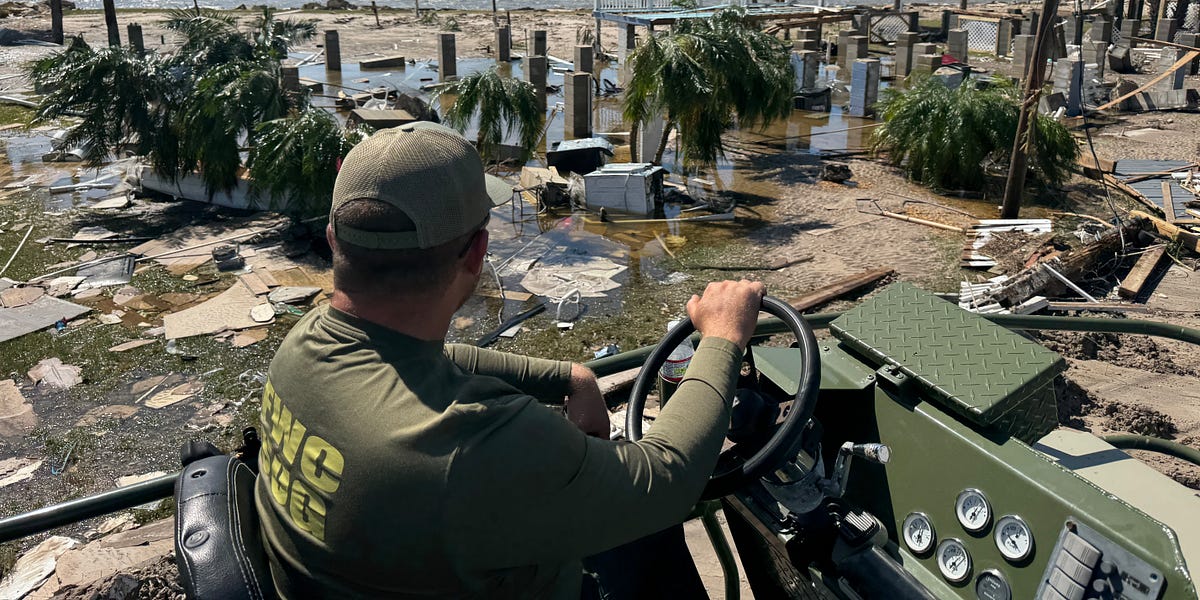Dear Reader,
This month we’re publishing our 100 issue. At this milestone, Hot House’s mission has never been more urgent. We’re still reckoning with the devastation wrought by Hurricane Helene and Milton. Those living in Asheville, North Carolina, didn’t think they’d have to worry about floods from Category 4 hurricanes. Meanwhile, wildfires are burning everywhere from Colorado to New Jersey and Connecticut, which recently declared a state of emergency over the rare forest fires and droughts around the tristate area.
What’s unique about this moment is how wrong we were about disaster safe zones. Everywhere, we’re contending with a climate reality of disasters we may not have been prepared for. At Hot House, we’ve been examining solutions to the climate emergency for nearly half a decade — and we don’t plan on stopping anytime soon.
This issue follows in this climate solutions and preparedness vein. Climate reporter Angely Mercado offers up solutions to those living in hurricane zones. This month’s Blueprint offers readers in those zones steps they can take to prepare for hurricanes, resources they can consult, and tips on building climate-resilient communities.
As always, we hope our work is a service to you and that you find issue 100 as helpful as you did issue 1. Take care of yourselves, dear reader. And hopefully someone else too. — Tekendra
P.S. Enjoy what you’re reading? Click here and subscribe to support this work for the long haul!
By Angely Mercado

Several storms have left multiple states in disarray. Hurricane Helene made landfall in Florida at the end of September, destroying homes and flooding entire communities. Hurricane Milton followed in early October with more flooding and property damage up the East Coast.
A forecast from the National Oceanic and Atmospheric Administration (NOAA) warned us of an above-average hurricane season. NOAA credited “human-caused climate change” for the warmer-than-average ocean temperatures that increasingly fuel storms and increase the rate of sea level rise. The season was quiet for a bit, and then exploded in late September and into October. And though the season usually slows down going into the end of November. A recent report from The Washington Post stated that since records began in 1850, a major hurricane has not made landfall in the U.S. That doesn’t mean that a smaller hurricane or tropical storm can’t form and hit landfall before the end of next month.
Jennifer Horney, a University of Delaware professor, who focuses on the public health impacts of extreme weather disasters, says the impacts of Hurricane Helene in North Carolina are a good example of why even areas that were once considered less disaster prone should start planning ahead.
“People had relocated to western North Carolina thinking that it was a climate refugee from areas like Florida and California,” she said. “I think there’s a little bit of complacency when we think that we’re not at risk.”
Horney’s advice for facing down a world with stronger and more frequent storms is to learn and to constantly stay updated.
First, learn about hurricane response and risk in your area
-
FEMA’S search tools help you learn your flood risk. If you’re worried about flooding in your area and aren’t sure about how to start planning, FEMA has a search tool that allows you to check the likelihood of flooding in your area and areas adjacent to where you live.
-
Gather some supplies. If you aren’t sure about what to have in your home, the government website Ready.gov has a simple outline to follow for making a supply kit. Horney suggests that households gather enough supplies to last them at least 72 hours. This includes food, water, medicines, or anything a person or pet in the household may require.
-
Protect your stuff. If you own your home or a property, call your homeowner’s insurance and make sure you understand what your coverage protects and can help you replace. If you are a renter, consider looking up renter’s insurance to protect personal items that could be costly to repair or replace. Renter’s insurance may not explicitly cover “hurricane” damage, but hazards related to the extreme weather like water damage or wind-related damage. Beyond insurance, move your important documents to a safe place, put them in a waterproof folder or small safe to minimize the chance of them being damaged.
Prepare for the incoming hurricane
-
Find multiple ways to stay informed. Finding different ways to stay informed on the handful of days leading up to a storm forming is imperative to better planning. The Red Cross has an emergency planning app that includes alerts and ideas for planning. Horney says that she personally checks the National Hurricane Center’s website for regular updates.
-
Follow local emergency services online. Horney suggests looking up official Facebook, X, or Instagram accounts for local emergency responders. This could include a local precinct, a county-wide emergency response agency, local officials, and local fire departments. Having information about local shelters, updates on evacuation plans, and other suggestions from official sources can help shape your shelter in place or evacuation plans as a hurricane gets closer to your area.
-
Get backup communication. At some point during an especially bad storm, your phone service may become unreliable. You may lose power, which means you’ll lose your access to Wi-Fi. If you’re in an area that’s likely to experience outages, get a hand crank or a battery powered radio in order to stay informed about local conditions.
-
Know your zone. Do you know if you’re in an evacuation zone? Double check your local news reports about what neighborhoods/areas should consider evacuation as a storm comes closer. Some city or state websites also offer maps to highlight which areas should evacuate before a storm. For example, here’s NYC’s emergency management webpage for coastal flooding and hurricanes.
Bonus: Think about next year’s hurricane season.
-
Learn about upcoming hurricanes before they show up on a map. Once the next hurricane season starts in early June, check on updates from the National Weather Service’s website. Further down on the home page, there’s an “active alerts” section that lists weather conditions, including hurricanes. Towards the top left of the homepage, there’s a search bar where you can plug in your zip code or city for local forecasts.
-
Take note of what made you nervous this year. If you were worried about buying last minute supplies, consider planning ahead of time instead of scrambling to buy things in the last two days or so before a hurricane is expected to make landfall near you. Buy supplies like batteries or portable phone and laptop chargers throughout the year as electronic deals come up.
-
Build a community of resilience. Compare notes on preparedness with your neighbors and extended family who also happen to live in hurricane-prone regions of the U.S. Someone with more experience dealing with tropical storms may have some useful tips for riding out a storm. Having a trusted community that you can compare ideas with is also useful for future evacuation plans.
This edition of Hothouse is edited by Tekendra Parmar and published by Cadence Bambenek. We rely on readers to support us, and everything we publish is free to read. Follow us on Twitter or LinkedIn.
Thank you to the readers, paying subscribers, and partners who believe in our mission. We couldn’t do this work without you.








